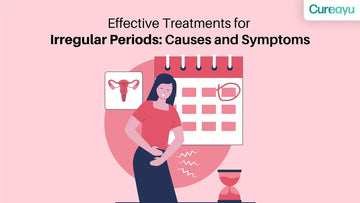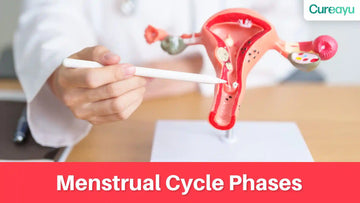Irregular periods are a common concern that many women face at various stages of life. Whether it’s a skipped period, prolonged bleeding, or an unpredictable cycle, these irregularities can be frustrating and may even signal underlying health issues. Understanding the irregular periods causes, their symptoms, and effective treatments is essential for maintaining reproductive health and overall well-being. In this blog, we’ll delve into what causes irregular periods, the effects of irregular periods on the body, and practical steps for managing and treating this condition.
Also Read: A Comprehensive Guide to Period Pain Relief: Strategies for Comfort and Well-being
What Are Irregular Periods?
Irregular periods refer to variations in the menstrual cycle, which typically ranges from 21 to 35 days. When the cycle’s length fluctuates significantly or periods are missed altogether, it’s considered irregular. Types of irregularities include:
- Oligomenorrhea: Infrequent periods.
- Polymenorrhea: Frequent periods.
- Amenorrhea: Absence of periods.
Irregular periods are often linked to hormonal imbalances, lifestyle factors, or medical conditions. Identifying the type and reasons for irregular periods is the first step toward finding the right solution.
What Causes Irregular Periods?
- Hormonal Imbalance: Fluctuations in estrogen and progesterone can disrupt the menstrual cycle. These changes may occur during puberty, pregnancy, or menopause.
- Stress: High stress levels can affect the hypothalamus—the part of the brain that regulates hormones—leading to irregular cycles. Prolonged stress may worsen the effects of irregular periods on the body over time.
- Polycystic Ovary Syndrome (PCOS): PCOS often causes hormonal imbalances and irregular ovulation. It’s a leading cause of irregular periods and is commonly accompanied by acne, weight gain, and excessive hair growth.
- Thyroid Disorders: Both hypothyroidism and hyperthyroidism can interfere with menstrual regularity. Thyroid-related irregularities often come with symptoms like fatigue, weight changes, and changes in heart rate.
- Weight Fluctuations: Rapid weight loss or gain can disrupt hormone levels and trigger irregular periods symptoms like missed or heavy periods. Maintaining a balanced weight is crucial for menstrual health.
- Excessive Exercise: Intense physical activity, especially in athletes, can lead to hormonal imbalances and irregular cycles. Moderation and proper nutrition are essential.
- Medications: Certain medications, including birth control and chemotherapy drugs, can cause irregular periods reasons as a side effect. Always consult your doctor if you suspect medication is affecting your cycle.
Also Read: Understanding Ovarian Cyst Symptoms: A Comprehensive Guide
Irregular Period Symptoms
Recognizing irregular periods symptoms is crucial for understanding the underlying cause. Common signs include:
- Missed Periods: Skipping one or more cycles without an obvious reason.
- Heavy Bleeding: Unusually heavy flow or passing large clots, which may lead to anemia.
- Light Periods: Very light bleeding or spotting between cycles.
- Frequent Periods: Cycles shorter than 21 days, resulting in more frequent menstruation.
- Painful Periods: Severe cramps that interfere with daily activities.
- Prolonged Periods: Bleeding lasting longer than seven days.
- Irregular Cycle Length: Noticeable variations in cycle length from month to month.
These symptoms not only disrupt daily life but may also have long-term effects of irregular periods on the body, such as hormonal imbalance, difficulty in conceiving, or anemia due to heavy bleeding.
Reasons for Irregular Periods
- Puberty: Hormonal changes during puberty often result in irregular cycles. It can take a few years for periods to become regular.
- Perimenopause: The transition to menopause is marked by hormonal fluctuations, causing irregularities. This phase often includes other symptoms like mood swings and hot flashes.
- Breastfeeding: Lactation suppresses ovulation, leading to missed or irregular periods. Cycles typically return to normal after breastfeeding decreases.
- Contraception: Starting or stopping birth control can temporarily disrupt your cycle. Your body may need a few months to adjust.
- Chronic Illness: Conditions like diabetes or celiac disease can interfere with hormonal balance, leading to irregular cycles.
- Eating Disorders: Disorders like anorexia or bulimia affect hormone production and disrupt menstruation. Proper treatment and nutritional support are vital.
- Lifestyle Changes: Travel, shift work, or major life changes can throw off your internal clock, leading to irregular cycles.
Also Read: PCOD Problem in Women and its Impact on Female Fertility
Irregular Periods Treatment
Managing irregular periods involves addressing the root cause and adopting lifestyle adjustments. Here are some effective treatment options:
- Lifestyle Changes:
- Maintain a healthy weight.
- Reduce stress with relaxation techniques like yoga or meditation.
- Avoid over-exercising.
- Hormonal Therapy: Birth control pills or hormone replacement therapy can help balance hormones and regulate cycles. Consult a healthcare provider for personalized advice.
- Dietary Adjustments: A nutrient-rich diet supports hormonal health. Include foods rich in iron, calcium, and vitamins to combat the effects of irregular periods on the body.
- Regular Exercise: Moderate physical activity promotes hormonal balance and reduces stress, improving menstrual regularity.
- Medical Treatment: Treating underlying conditions like PCOS or thyroid disorders can significantly improve menstrual health.
- Herbal Remedies: Supplements like chasteberry or evening primrose oil may help regulate cycles. Always consult a healthcare provider before starting any herbal treatments.
- Acupuncture: This traditional therapy can balance hormones and improve menstrual regularity. It’s worth considering as a complementary approach.
Conclusion
Irregular periods can be a source of discomfort and concern, but understanding their causes, symptoms, and treatment options is the first step toward effective management. Whether it’s adopting healthier habits, seeking medical advice, or exploring alternative remedies, there are solutions to help regulate your cycle and reduce the effects of irregular periods on the body. If you experience persistent irregularities, don’t hesitate to consult a healthcare provider for a personalized approach. Remember, staying informed and proactive is key to maintaining your reproductive health.












